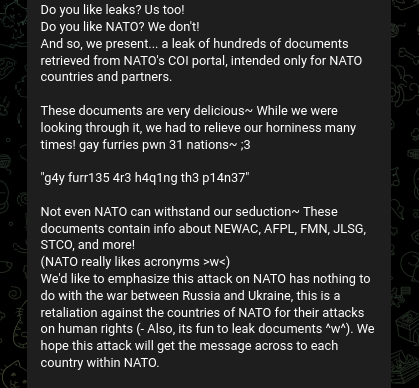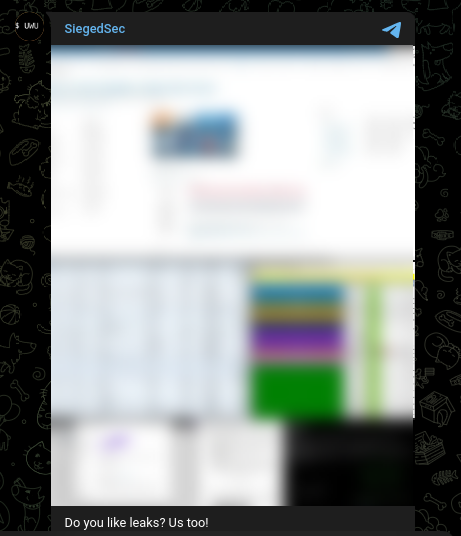The notorious hacker group, SiegedSec, has claimed responsibility for a new NATO data breach. NATO is yet to acknowledge or rebut the claim.
According to their recent announcement on Telegram, the hackers assert that they have successfully accessed and leaked hundreds of confidential documents from NATO’s COI portal, a platform meant exclusively for NATO countries and partners.
The leaked documents purportedly contain sensitive information related to organizations like NEWAC, AFPL, FMN, JLSG, STCO, and more.
The hackers taunted NATO in their Telegram posts in their bold and brazen style. They mocked the organization while claiming the NATO data breach at the same time.
They claimed to have leaked hundreds of documents from the NATO COI portal and other important files — particularly those intended for NATO members only.
NATO data breach explained: Sensitive documents leaked!

In a rather colorful manner, they boast about the NATO data breach and the documents they managed to acquire, playfully referring to them as ‘delicious.’
Curiously, they intersperse their announcement with unrelated personal remarks, mentioning the need to ‘relieve their horniness’ and making references to ‘gay furries.’ Odd as it may seem, the group seems to revel in an unconventional style.

The NATO data breach, if confirmed, will affect an astounding 31 nations within NATO, leaving behind their signature, ‘gay furr135 4r3 h4q1ng th3 p14n37.’
This peculiar message challenges even NATO’s defenses, suggesting a seductive undertone that, quite frankly, raises more questions than answers.
Surprisingly, the documents acquired from the NATO data breach are not related to the ongoing conflict between Russia and Ukraine, as the group emphasizes.
Instead, they claim their motives are tied to retaliation against NATO countries for alleged assaults on human rights.
The leaked documents provide insights into organizations like NEWAC, AFPL, FMN, JLSG, and STCO, all of which seem to have an affinity for acronyms, as playfully noted by the hackers. Whether this information holds the key to their intentions or not remains uncertain.
Threat intelligence services list SiegedSec as a prolific hacker group.
Evidence show that the group managed to infiltrate sensitive information, leaking emails and databases from no less than 30 distinct companies from February to June 2022, said a DarkOwl assessment report.
Surprisingly, very few of these affected companies have made any public disclosures regarding cybersecurity incidents.
The strange thing about the NATO data breach
While claiming the alleged NATO data breach, SiegedSec have distances themselves from the Russo-Ukrainian conflict, asserting that its attack focuses solely on NATO member states.
They seem to take a whimsical approach to their actions, finding enjoyment in leaking documents as part of their endeavor.
Prior to this audacious NATO data breach, Lithuania faced its own cybersecurity challenges on the eve of the NATO summit.
The head of Lithuania’s National Cyber Security Centre, Liudas Alisauskas, confirmed that the country endured a series of distributed denial-of-service (DDoS) attacks.
These attacks overwhelmed Lithuania’s systems with a deluge of internet traffic, causing disruptions to essential services like tourism information sites and public transport apps.
Alisauskas expressed concern over the targeted DDoS attacks, noting, “These are basic services that are needed to be available to our guests.”
The situation prompted Lithuania’s authorities to fortify their cyber defense efforts, collaborating with intelligence agencies, law enforcement, and international partners to mitigate the threats.
In addition to the DDoS attacks, the Lithuanian authorities received reports of other cyber incidents, including hacking a regional radio station.
The hackers used the platform to disseminate disinformation targeting NATO and Ukraine, raising further alarms about potential cyber threats against critical infrastructure.
It is evident that cyber warfare poses a significant and ongoing challenge to international security, with hackers like SiegedSec capable of breaching even highly secure systems like NATO’s COI portal.
While the motivations behind SiegedSec’s actions remain enigmatic, one thing is clear: the ramifications of their NATO data breach are far-reaching and requires immediate attention.
Media Disclaimer: This report is based on internal and external research obtained through various means. The information provided is for reference purposes only, and users bear full responsibility for their reliance on it. The Cyber Express assumes no liability for the accuracy or consequences of using this information.
